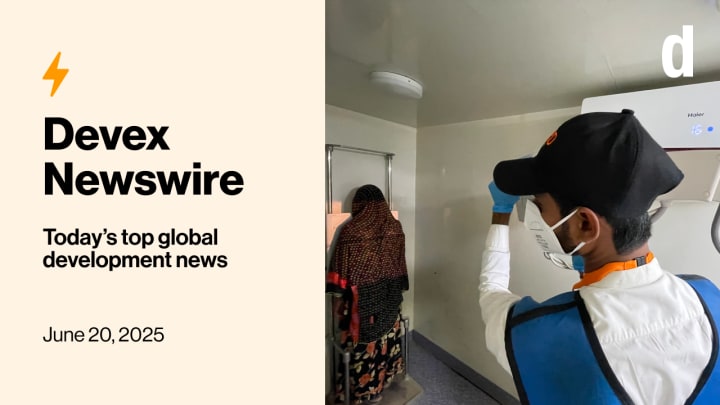
Under President Donald Trump, most aid organizations have seen their U.S. funds evaporate, not preserved. But there have been a lucky few. We look at one of them and its journey.
Also in today’s edition: Why the U.N.’s relocation plans for Kenya make logistical and symbolic sense.
Happening today: At 10 a.m. ET (4 p.m. CET), we’ll be joined by Dr. Mark Dybul of Georgetown University’s Global Health Institute, Dr. Jennifer Kates of KFF, Asia Russell of Health GAP, and Dr. Jirair Ratevosian of Duke Global Health Institute to discuss the future of the U.S. global HIV initiative PEPFAR. Register here to join us — we’ll send you a recording if you can’t attend live.
TB honest
Like so many organizations, the Stop TB Partnership found itself on an on-again-off-again merry-go-round ride as its U.S. assistance was terminated and then unterminated. But in its case, the taps stayed on and it was ultimately able to retain all of its U.S. funding.
How did Stop TB, which is hosted by the United Nations Office for Project Services, do it? A large part was simply that its mission was deemed to be in the American interest.
Tuberculosis is “among the most lethal infectious diseases in the world and the United States is experiencing one of its worst outbreaks. This funding will work to protect the exposure to American[s] from infectious cases of TB that originate overseas,” states a White House budget document.
“We are back in business — to put it this way — with the same amount of funding as we had,” Dr. Lucica Ditiu, Stop TB’s executive director, tells my colleague Sara Jerving.
But that doesn’t mean it’s back to business as usual.
The Geneva-based organization had to refine the scope of the work it does with that U.S. funding, and that means laying off some staff and parting ways with some implementing partners.
“There is much more granularity expected — but on the other hand, we do that with almost every other donor so we are not doing anything extraordinary for the U.S.,” Ditiu says. “I find it logical.”
At the same time, “Everything that is not directly linked to saving the lives of people with TB or delivering services specifically for them is not really a priority,” she says, noting that she expects the Trump administration may change the list of priority countries it works with.
But Ditiu worries that the wider tuberculosis fight could still be in trouble. For example, U.S. cuts halted research for new drugs and diagnostics, including new treatment regimes for drug-resistant TB.
“Drug-resistant TB is a really, very difficult disease, very problematic. It's a risk for all of us,” she says. “The fact that there were interruptions on the trials with some new drug combinations and so on — it's a very difficult one to recover [from].”
Read: Stop TB Partnership retains US funds but must revise scope, cut staff
Background: How Trump’s aid freeze is threatening tuberculosis programs
🎧 Listen: For the latest episode of our weekly podcast series, Devex’s Rumbi Chakamba, Ayenat Mersie, and Jesse Chase-Lubitz unpack how the Trump administration’s cuts to foreign aid could affect American farmers and dig into other top global development stories from the week.
Moving on
In some ways, Stop TB’s success in retaining U.S. funds is all the more impressive given that it’s a U.N. entity, and the world body has had a big fat target on its back ever since the first Trump administration.
In the face of budget shortfalls, including the likely loss of U.S. funding, the United Nations is relocating some of its offices to Nairobi, Kenya — a decision that is not only logistical, but “a chance to decolonize global governance,” argues Teta Mukulira, a policy analyst with Development Reimagined, in a Devex opinion piece.
Earlier this year, U.N. Secretary-General António Guterres and the government of Kenya announced that the global offices of UNICEF, UNFPA, and UN Women would be relocated — either in part or in full — to Nairobi by 2026.
“Some observers have framed the move narrowly as cost-saving, especially given a widespread spate of aid cuts across the world,” Mukulira writes. “However, this narrative downplays the most significant aspect of the move — that it could well mark an encouraging step toward localizing the U.N., through redistributing decision-making power, leadership, and institutional presence to regions where its agencies operate most actively.”
Opinion: Why the UN’s recent Africa relocation news matters
A decade on
The Asian Infrastructure Investment Bank was an upstart when it began a decade ago. Since then, the bank has approved 319 projects, worth nearly $61 billion in total, making it a powerful player in the multilateral space.
The Beijing-based bank will hold its annual meeting next week, marking the 10th anniversary of its establishment. So we decided to mark the occasion by breaking down AIIB’s activities and mandate.
That mandate is guided by its four priorities: green infrastructure, connectivity and regional cooperation, technology-enabled infrastructure, and private-capital mobilization, my colleague Miguel Antonio Tamonan writes.
Here’s a sampling of its largest approved projects:
• A $1 billion guarantee facility to the International Bank for Reconstruction and Development, which will provide additional lending capacity to IBRD.
• $1 billion for the Henan Flood Emergency Rehabilitation and Recovery Project in China.
• $999 million to modernize the health system in Indonesia by addressing gaps in medical equipment provision, especially in rural and remote areas.
• $670 million to promote an inclusive and resilient market economy in Uzbekistan through reforms, fiscal risk management, social inclusion, and green resilience.
Read: AIIB's 10th anniversary — where is the money going? (Pro)
+ Curious about the insights that drive global development? Experience Devex Pro with a 15-day free trial. Explore expert analyses, unlock hidden funding opportunities, connect with key players at exclusive events, and access a wealth of knowledge you won’t find anywhere else.
Barrels of aid, courtesy of Big Oil
The OPEC Fund for International Development wrapped up its annual Development Forum this week with more than $1 billion in new financing on the table, a new push to boost trade resilience — and a continued emphasis on climate.
The Vienna-based lender, backed by the 12-member oil-producing bloc, has committed over $27 billion to development projects in more than 125 countries over its 49-year history. At this week’s meetings, it signed $362 million in loan agreements during the event and announced $720 million in second-quarter commitments. Among the deals: $300 million to Rwanda for infrastructure, entrepreneurship and basic services; $25 million for Cameroonian rice value chains; and a new trade finance initiative designed to support countries’ ability to access essential imports.
It also signed a deal with the Islamic Organization for Food Security to promote climate-resilient agriculture and rolled out new agreements with Grenada and the Solomon Islands under its Small Island Developing States initiative — a platform to scale climate adaptation and sustainable development across SIDS.
If these last couple of agreements leave you scratching your head, you’re not alone. After all, this is OPEC we’re talking about — that OPEC, the group of the world’s top oil producers, led by a secretary-general who called oil a “gift from God” at last year’s U.N. climate conference, and whose members reportedly thwarted deals on fossil fuel phaseout at the COP28 climate conference.
Still, the fund, whose “supreme authority” is made up of member state finance ministers, says it is committed to ramping up its climate financing to 40% by 2030.
Bonn of contention
My colleague Jesse Chase-Lubitz is still at the Bonn midyear climate meetings and she tells me that Brazil’s incoming COP30 presidency once again emphasized that the November U.N. climate conference will be about implementation, rather than new ambition, in its fourth letter to the international community.
It released an action agenda today, which outlines six general themes and 30 objectives, ranging from tripling renewable energy and halting deforestation to leveraging AI and digital infrastructure for climate progress. It also made a strong call to operationalize the Global Stocktake, or GST, during a press briefing this morning at the midyear meetings. GST is meant to evaluate how countries are doing on mitigation, adaptation, and their means of implementation.
Experts at Bonn this week have told Jesse that we’re unlikely to see Brazil address the primary issues that came out of last year’s COP29 in Baku, Azerbaijan, however. The biggest bone of contention among parties is still finance, but so far, no one is discussing how to follow through on the $300 billion goal set in Baku and there are no negotiations planned to do so.
Instead, most consultations have been focused on the private sector, with many of them including panels rather than allowing ample time to hear from think tanks and civil society. “The overall narrative in the finance rooms is around the role of the private sector,” says Salomé Lehtman, a project and advocacy adviser at Mercy Corps. “And there’s general frustration from developing countries following the Baku debacle on [finance], but it doesn’t feel like they are being heard.”
ICYMI: Climate negotiations in Bonn begin with familiar finance clash
+ This month’s Financing for Development, or FfD4, summit presents a pivotal opportunity for policymakers and influencers to chart a new path for development funding, and Devex has been hosting a series of Pro briefings to set the agenda.
On June 26, we’ll have an exclusive conversation on DFIs and the future of finance with Rémy Rioux, the CEO of the French Development Agency AFD. Save your spot now.
And if you’re planning to be in Seville for FfD4, be sure to register to visit us at Casa Devex, where we’ll be hosting exclusive interviews and panels with development leaders at a Spanish villa between June 29 and July 1. Sign up here.
In other news
The Democratic Republic of Congo and Rwanda have signed a provisional peace agreement aimed at ending the conflict in eastern DRC, after three days of U.S.-mediated talks in Washington. [Al Jazeera]
A new Lancet study warns that more than 13 million people in Africa could catch malaria due to proposed U.S. funding cuts to the President's Malaria Initiative. [Financial Times]
Violence against children in armed conflict reached unprecedented levels in 2024, with a 25% surge in grave violations, with Gaza and the West Bank recording the highest number of cases, followed by DRC, Somalia, Nigeria, and Haiti. [AP]
Sign up to Newswire for an inside look at the biggest stories in global development.




